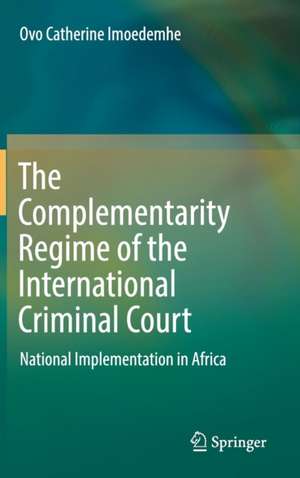The Complementarity Regime of the International Criminal Court: National Implementation in Africa
Autor Ovo Catherine Imoedemheen Limba Engleză Hardback – 14 dec 2016
This book analyses how the complementarity regime of the ICC’s Rome Statute can be implemented in member states, specifically focusing on African states and Nigeria. Complementarity is the principle that outlines the primacy of national courts to prosecute a defendant unless a state is ‘unwilling’ or ‘genuinely unable to act’, assuming the crime is of a ‘sufficient gravity’ for the International Criminal Court (ICC). It is stipulated in the Rome Statute without a clear and comprehensive framework for how states can implement it. The book proposes such a framework and argues that a mutually inclusive interpretation and application of complementarity would increase domestic prosecutions and reduce self-referrals to the ICC.
African states need to have an appropriate legal framework in place, implementing legislation and institutional capacity as well as credible judiciaries to investigate and prosecute international crimes. The mutually inclusive interpretation of the principle of complementarity would entail the ICC providing assistance to states in instituting this framework while being available to fill the gaps until such time as these states meet a defined threshold of institutional preparedness sufficient to acquire domestic prosecution. The minimum complementarity threshold includes proscribing the Rome Statute crimes in domestic criminal law and ensuring the institutional preparedness to conduct complementarity-based prosecution of international crimes. Furthermore, it assists the ICC in ensuring consistency in its interpretation of complementarity.
| Toate formatele și edițiile | Preț | Express |
|---|---|---|
| Paperback (1) | 778.94 lei 6-8 săpt. | |
| Springer International Publishing – 3 iul 2018 | 778.94 lei 6-8 săpt. | |
| Hardback (1) | 784.92 lei 6-8 săpt. | |
| Springer International Publishing – 14 dec 2016 | 784.92 lei 6-8 săpt. |
Preț: 784.92 lei
Preț vechi: 957.22 lei
-18% Nou
Puncte Express: 1177
Preț estimativ în valută:
150.23€ • 162.16$ • 125.97£
150.23€ • 162.16$ • 125.97£
Carte tipărită la comandă
Livrare economică 19 aprilie-03 mai
Preluare comenzi: 021 569.72.76
Specificații
ISBN-13: 9783319467795
ISBN-10: 3319467794
Pagini: 320
Ilustrații: XVII, 229 p.
Dimensiuni: 155 x 235 x 16 mm
Greutate: 0.53 kg
Ediția:1st ed. 2017
Editura: Springer International Publishing
Colecția Springer
Locul publicării:Cham, Switzerland
ISBN-10: 3319467794
Pagini: 320
Ilustrații: XVII, 229 p.
Dimensiuni: 155 x 235 x 16 mm
Greutate: 0.53 kg
Ediția:1st ed. 2017
Editura: Springer International Publishing
Colecția Springer
Locul publicării:Cham, Switzerland
Cuprins
The International Criminal Court as the new paradigm to close impunity gaps.- The complimentarity regime of the Rome Statute: An analysis of its components.- National implementation of the Rome Statute of the International Criminal Court: Obligations and challenges for states parties.- Domestic prosecutions in Africa under the complementarity regime of the Rome Statute: A practical approach.- Unpacking the tension between the African Union and the ICC: The way forward.- Institutional preparedness for the complementarity regime: Nigeria as a case study.- Mutual inclusivity: A sine qua non to national implementation of complementarity.
Textul de pe ultima copertă
This book analyses how the complementarity regime of the ICC’s Rome Statute can be implemented in member states, specifically focusing on African states and Nigeria. Complementarity is the principle that outlines the primacy of national courts to prosecute a defendant unless a state is ‘unwilling’ or ‘genuinely unable to act’, assuming the crime is of a ‘sufficient gravity’ for the International Criminal Court (ICC). It is stipulated in the Rome Statute without a clear and comprehensive framework for how states can implement it. The book proposes such a framework and argues that a mutually inclusive interpretation and application of complementarity would increase domestic prosecutions and reduce self-referrals to the ICC.
African states need to have an appropriate legal framework in place, implementing legislation and institutional capacity as well as credible judiciaries to investigate and prosecute international crimes. The mutually inclusive interpretation of the principle of complementarity would entail the ICC providing assistance to states in instituting this framework while being available to fill the gaps until such time as these states meet a defined threshold of institutional preparedness sufficient to acquire domestic prosecution. The minimum complementarity threshold includes proscribing the Rome Statute crimes in domestic criminal law and ensuring the institutional preparedness to conduct complementarity-based prosecution of international crimes. Furthermore, it assists the ICC in ensuring consistency in its interpretation of complementarity.
Caracteristici
Uses a policy-oriented approach
Proposes a modus operandi for the implementation of complementarity
Includes a case study on Nigeria
Proposes a modus operandi for the implementation of complementarity
Includes a case study on Nigeria










